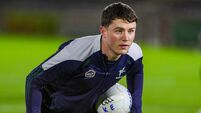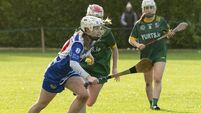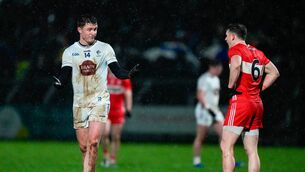In conversation with Willie Maher - National Head of Hurling
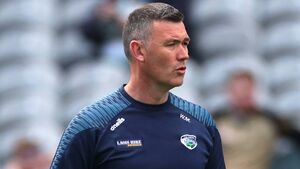
National Head of Hurling, Willie Maher Photo: ©INPHO/James Crombie
A native of Ballingarry in South Tipperary Willie Maher took up the role of National Head of Hurling earlier this year. A product of St Kieran’s College in Kilkenny, as well as WIT and UCD, Maher played both hurling and football right through the ages with Tipperary. Willie Maher then became a very well known, respected and successful hurling coach and manager in his native Tipperary, with Waterford, in Dublin with Cuala and with Laois so his pedigree befits the role he now fills.
We sat down with Willie Maher in the past week to discuss his role as well as the methods he will employ in filling the role.
Willie your involvement with what might be called the elite counties and then with the counties of the next tier gives you great insight into where hurling is and where hurling should be?
Finding out what's actually happening on the ground and getting underneath the bonnet of hurling in each county and just finding out participation levels, what's happening schools, is there third level institutions in counties and understanding all this is important. These are all pieces in the Hurling Development Jigsaw that we're looking to put together and put meaningful change initiatives out there. There's a huge amount going on but I think it's very much local so how can we find out what's happening locally and tailor our plans accordingly?
You have big shoes to fill, if you don't mind me putting like that, in that the predecessors in your role, or similar role, were Paudie Butler and Martin Fogarty so what attracted you to the role in the first place?
A love for the game is probably the real big piece. Paudie coached me to a minor All Ireland back in 1996 so I know him well and I’ve been in constant contact with Martin as well. I suppose my baseline, no more than theirs, is a love of the game. How I’m going to go about the role maybe is a little bit different. We’re trying to work within the Association to put Strategic Plans in place. When you start talking about Strategic Plans people start switching off and saying 'Oh God, that will be another report or something else'. It’s how do we understand meaningfully what's happening and put meaningful initiatives in place that are measurable and we can see where they're going in consultation with the clubs and the counties in Leinster and Munster and around the country. So, it's a big role but maybe a slightly different approach than my predecessors like holding people to account, putting measurable plans in place and see can we move the dial forward in hurling throughout the country.
Did the gap between Martin's departure and your appointment have a negative impact on the progress of hurling or was it easy to pick up the pieces?
There were a lot of things in there as well like COVID which was pretty disruptive to the whole country not alone hurling. I think it's important to really look forward and see where we're at. There's a huge optimism and energy behind hurling at the moment. That was very much exemplified during our night in Newbridge where we had over 150 people through our Hurling Roadshow with Jarlath (Burns) and Tom Ryan (Ard Stuirtheoir). There's a lot of power behind it, which is great and obviously with Kildare’s great win as well. There’s a lot of people behind us and it's a case of putting meaningful plans in place to actually move it forward; I’m really excited about the whole thing.
How has the role changed in the last number of years? Is it different or has it been tweaked in any way?
Martin and Paudie were traveling the high roads and byroads of the country delivering actual sessions on the ground. I won't be doing that. It will be very much finding out what's happening in counties and then enabling people to deliver similar initiatives or building a team around me that can deliver similar types of initiatives to make impacts. The landscape of hurling throughout the country is stark from being very, very strong in certain counties to those middle area of counties. It's that yo-yo effect as regards McDonagh Champions but I think that's a separate piece. Then above the Dublin to Galway line just increasing the number of new clubs would be priority. Different problems, different areas but huge energy and vibrancy behind what we want to do in a strategic and measurable way.
You mentioned the road shows, is your role more a listening role than anything else at this early stage?
Yeah, it is very much so. I think it's just important to understand what's actually happening in each county as a one size won't fit all in this instance. We’re trying to change approach, change tact. There has to be a lot of internal looking within counties and clubs to say, how can we provide hurling to our membership? Hurling is our National Sport; it's part of the Association. We have integration coming at the end of ‘27 with ladies football and camogie coming on board so how do we position our Association across all those sports, including Rounders and Handball as well so that we're providing our membership with access to these sports.
If you look at the example of Ulster. There are 360 GAA clubs that play football but there's only 112 who play hurling. There are big gaps in that area that we need to look at and use that opportunity to actually provide hurling experience to our membership. I used to work in United Healthcare with a Kildare man and he just said to me he never had the opportunity to hold a hurley. That's not what we want to be providing to our membership. We need access to hurling if it's gear, if it's simply coaching time, if it's time in primary schools, we're working towards all those initiatives. The role is vast but I think we should be very focused on the initiatives that we provide, the resources that we provide and it's not always about money, sometimes it's time, time in the schedule, time in the county fixtures planning. There's a whole lot of barriers to hurling here and we're looking to find out what they are number and how we can get over them.
You were a dual player yourself, Willie. Is the day of the dual player more or less finished, not just because of time and it's a huge time commitment, whether it be a club or county, to play in any sport and obviously, managers and coaches are not too happy to have dual players on board?
It's a real difficult one. I played hurling and football for Tipperary underage and I enjoyed it. I think that multi sports model is good for player and personal development. Kids are playing multitudes of sports now so we have to plug in around that. I managed a Tipperary minor team to win a minor All Ireland in 2012 with 14 dual players in football and they also won the Munster Football Final that year. It can be done. It might be 13 years ago at this stage but I think there is opportunity for our players to play. I don't know if that's possible at senior level, the demands of the game and the type of the schedule probably make it very, very difficult, but I think in underage, particularly, there is opportunity to play both games. I think as Irish people to play our National Sport should be a right and I think it's important that we provide access to kids to access that right.
You mentioned you were in Newbridge a few weeks ago. Obviously, Kildare has had great success, not just this year but in the last number of years. Maybe a little bit of yo, yo between the Christy Ring and that but they're now in the top echelons of hurling. Is the Kildare model the template?
I think it’s a template, definitely. Speaking with Colm Nolan, a member of the HDC (Hurling Development Committee) and heavily involved in the Kildare senior team, the importance of planning and Kildare had that, the importance of pushing the boundaries for what they believe is the right thing to do. Playing in Kilkenny, which Kilkenny facilitated, the players had access to high level hurling and they got people within their clubs, primarily Naas, to actually go and drive their kids to Kilkenny on a Wednesday night for 6/7 or 20 years. There's a lot of learnings that can be taken but will it suit other counties? Possibly but I think it's important to take the good bits out of that and try to make meaningful changes within counties.
Also in Kildare, apart from winning the McDonagh Cup, and that was an unbelievable achievement, a testament to David Herity’s work previously and now Brian Dowling and Richie Ruth, they’re looking to where they're going to go next. Having conversations with Colm during the week and it's really refreshing that they're not standing still, it’s where are we going next? They’ve climbed the mountain in winning the McDonagh matches, winning the Joe McDonagh outright, getting to Liam McCarthy. They're looking to know what mountain is next and there's a big one coming. It’s testament to the people involved that they're so organised and so focused on building success which is sustainable, which is really admirable. You couldn't but compliment everybody involved and their work over a long period of time but at the same time they're looking to where their plan is going to go next. I think it is a plan for other counties to take pieces out that suit them.
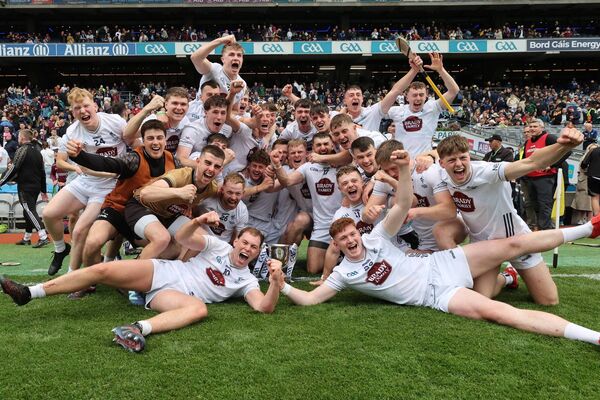
You played with the successful Kieran’s College and the Harty Cup is huge down in Munster too. Do counties like Kildare have to have strong schools hurling as a platform?
Absolutely yes. I think it's important to bridge that gap between 17/19/20 to actually bring players through and get used to winning at a high level which the schools provide. I think that has to be central to Kildare’s next phase. You look at the Offaly Colleges there, five or six years ago, I facilitated a lot of their players getting access to high level hurling, winning Leinster minor, beaten in an All-Ireland, winning Leinster U20, winning an All-Ireland, winning Joe McDonagh last year and staying up in the McCarthy Cup. I think there's a lot of learnings that can be taken. Look at the Leinster Colleges Final this year, Kieran’s and CBS, providing access to high level hurling for nearly 40 U19 players in Kilkenny. That's what we need to get in other counties. You look at the success of Dublin going back 20 years ago winning the All-Ireland with the Combined Schools and with Colaiste Eoin then going on their own and Sutton coming as an “A” College's team as well. These are all metrics and vehicles for development that we need to be accessing and I think schools is a huge part of that.
How involved can you and your committee get, from a structure point of view, with the National League and, indeed, with the championships?
As a Hurling Development Committee, I think we're in discussions and we can give advice to Central Council on structural changes. It's important that we review where we are; hurling is in an amazing place at the top so how do we facilitate growth going right down through the tiers is obviously the objective of my role and the HDC’s. We have 45 new clubs in the last three months so they're big initiatives. But back to the fixtures and the structures, I suppose those decisions are for all of the Association but at the same time, I think it's important that feedback and review is very central to any changes or any proposed changes that are going to be made.
The charge is that those at the top are only playing lip service to the Kildares and Laois’ who participated in the Joe McDonagh one weekend and then had to play the All-Ireland series the following weekend. Both Brian Dowling and Tommy Fitzgerald, the respective managers, were highly critical of that and not for the first time?
I agree and I was that soldier last year as manager of Laois. It’s a very difficult turnaround of six days particularly after losing and Tommy Fitz had to deal with that issue which is an extremely difficult situation and the counties obviously then shipped pretty heavy beatings in Newbridge and in Portlaoise. It's important to discuss these pieces and bring them to the relevant decision makers within the Association with concrete data and evidence and hopefully then make the right decision from a collective democratic situation within the Association.
Looking back at the Slaughtneil v Ruairi Óg Cushendall Ulster Club hurling semi-final last year and the counties in Ulster and Connacht competing at the Tier 2 and lower championships do you foresee a four-province hurling championship in the future?
I think, yes. We were over in Bekan in Mayo on a Roadshow four weeks ago about increasing the standards of play. So, why not? But we need to get other teams up to a standard to allow them to facilitate a Connacht championship. You mentioned Slaughtneil winning the Ulster Club and their semi-final with Cushendall and Portaferry and Dunloy are top level teams. It really shone a light on the quality of the club game within the North. I think it's something that the counties are looking for, particularly Antrim, they want to play in their Provincial Championship but I suppose it's a case of how do you fit that into Leinster participation? It's important to play in your own local championship but fitting it into the schedule is the issue and until we come to a more defined and updated system we'll have wait.
Throwing money at hurling, as has been done in the past, I think there was a €1m given to some of the “lesser counties”, is not necessarily going to achieve a huge amount. To me, it seems more like getting the structures right, getting the plans right and getting the people to buy into it?
I completely agree. Yes, we'd always like more resources and it would be great to be able to spend everything you wanted but that's not the world we live in. I think it's very much around aligning our priority areas. If that's participation, if that's participation in primary/secondary schools, if it's more clubs, new player pathways, if it's coaching initiatives that drive the standards up in hurling, I think I have to decide on that in consultation with many different stakeholders throughout the country. It's not a money issue. We would love more money but it's how do we fit hurling into the schedules across, particularly the Dublin to Galway line and up. How do we develop more units in those areas, how do we get the experience of hurling being played by the youth of our country. They're all, very, very key things and yes, some things cost money, but other things don't. I think it's about aligning the resources that we currently have in people. We have a Games Development staff of nearly up to 400 people nationally so how do we mobilise what we have at the moment by introducing new initiatives to allow the games to be played more. That's the key but it has to be meaningful structures and sustainable over time.
Have you been given particular “riding instructions” for the want of better wording, for a particular outcome when all this is over or is it very much open at this stage?
It's open but I think we will be setting very clear parameters. I like the riding analogy there, Pat, from a Cavanman living in Kildare but it’s hugely important to have measures and what's measured is done. If that's about participation numbers, if it's more clubs, if it's a more meaningful games program or for protection of players between the ages of 10 and 17 or afterwards, I think they're all meaningful things that can be measured. It's important to have measures on everything that we do and accountability across the board but again these have to be plans that are being developed within each individual county. I'm not in the business of telling people what to do, this is very much what can we do to define the issues in each county, put plans in place and measure them accordingly.
Finally, then, Willie, what would you hope would be the legacy that you will leave?
I think the legacy I would like to leave would be hurling being played in substantially more places across three very distinct groups. I think it's very, very strong in certain areas within McCarthy counties. I think there's other gaps. You look at something like demographics and how we're matched as regards population trends within our island. 45% of our population currently live on the east coast and that serviced by 20% of our clubs. I think there's a lot of challenges there. I suppose legacy would be putting more clubs in place, putting more opportunities for kids to play, but again, being accountable and measurable around the country. Maybe in Sligo’s instance, where you have two clubs currently, that we have six. More hurling being played throughout the country is the overall objective here. I'm absolutely delighted with the opportunity that I got to work on something that I absolutely adore and is very central to my life and the formation of who I am. I'm absolutely thrilled; I love going to Croke Park to work. It's a brilliant opportunity; I'm like a child going in there every morning but the responsibility of the role is not lost on me either. It's very important to give volunteers on the ground opportunities to experience the game of hurling and that's what we want to do.

